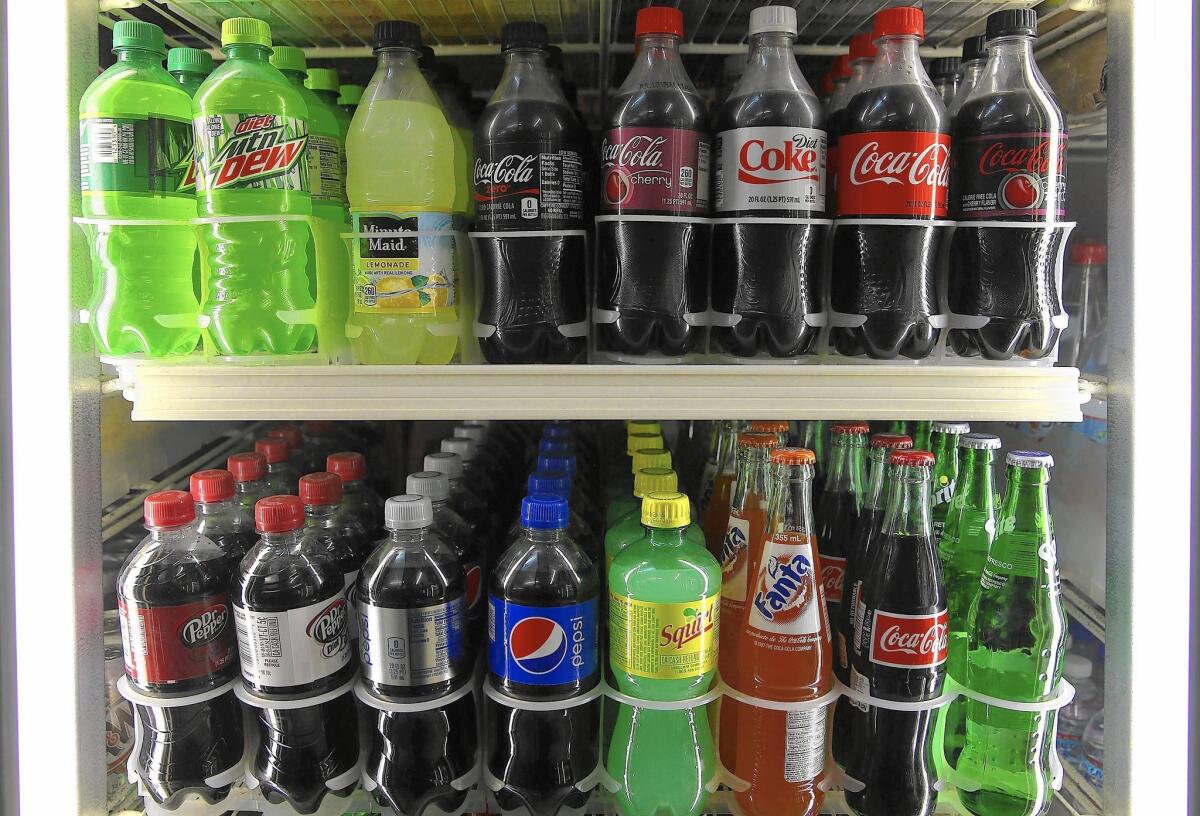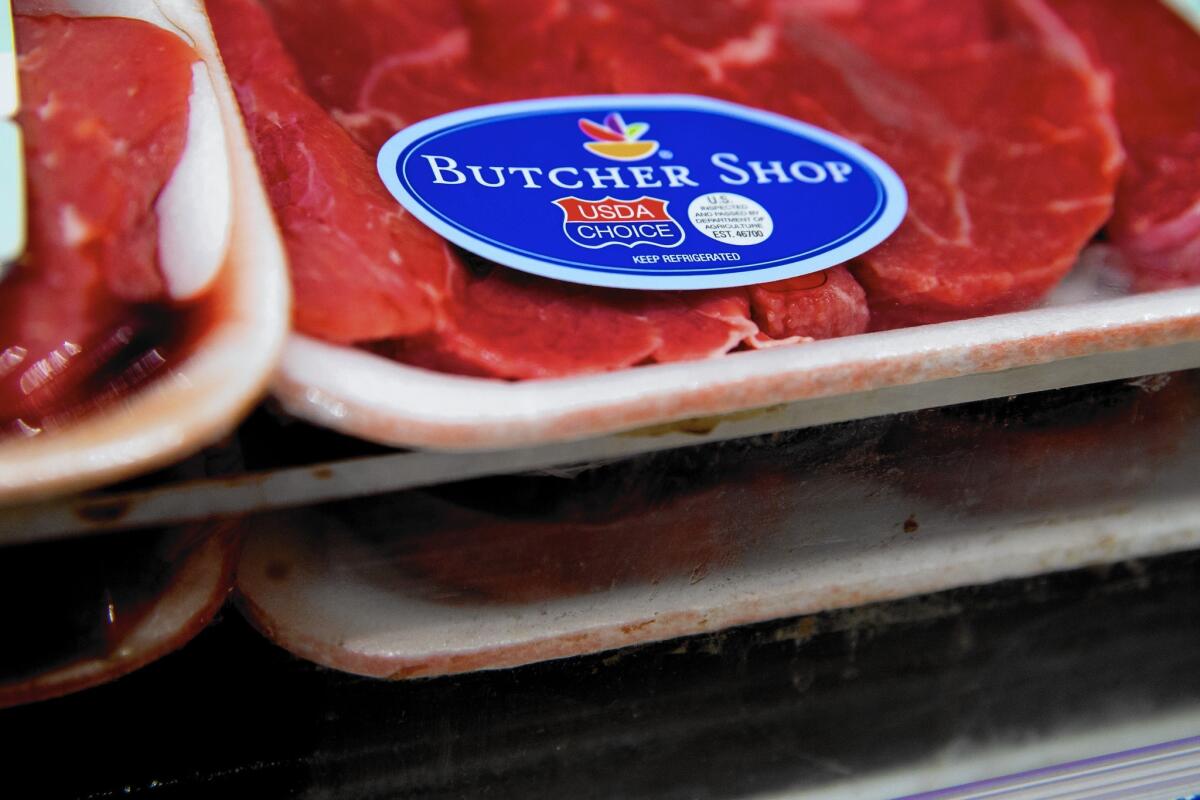Column: Why is the food industry dead set against warning labels?

A statewide Field Poll last week found that 78% of California voters support placing labels on sugary drinks that warn of possible health hazards, up from 74% two years ago.
- Share via
Consumers are frequently told that it’s their responsibility to make informed decisions. Otherwise, caveat emptor — let the buyer beware.
So it’s striking that some industries seem to work overtime preventing people from having all the information needed to choose wisely.
A statewide Field Poll last week found that 78% of California voters support placing labels on sugary drinks that warn of possible health hazards, up from 74% two years ago.
Yet the soda and beverage industry has spent millions of dollars over the last couple of years fighting such a requirement and similar regulations.
See more of our top stories on Facebook >>
And it’s not just the soda people. The agriculture industry doesn’t want labels that say that genetically modified ingredients are included in food products. The meat industry would prefer if people didn’t know the country of origin of their steaks and pork chops.
The message is clear: Consumers should make informed decisions, but not that informed, thank you very much.
“The information consumers need to make choices is being thwarted by big businesses,” said Dr. Harold Goldstein, executive director of the California Center for Public Health Advocacy, which commissioned the poll on sugary drink labels.
“This is the critical issue in public health today — the extent to which companies are undermining the health of the American people,” he told me. “They make products that harm the health of people and then use their profits to influence lawmakers not to do anything about it.”
And it works. A bill died in the state Senate Health Committee last week that would have required makers of soda, sports drinks and the like to warn on labels that “drinking beverages with added sugar contributes to obesity, diabetes and tooth decay.”
“The only reason that legislators aren’t supporting this bill is because big businesses and their money are scaring the heck out of politicians,” Goldstein said. “It’s exactly like what we’ve seen with the National Rifle Assn. and gun control.”
I asked CalBev, the California trade group representing makers of soft drinks and other non-alcoholic beverages, for a response to last week’s Field Poll. They sent me a statement from the organization’s executive director, Bob Achermann.
“A warning label that suggests beverages are a unique driver of health issues is inaccurate and would mislead people about complex conditions such as obesity and diabetes,” he said.
“The best way to promote balanced lifestyles is through fact-based information, rather than simplistic approaches that target just one product but don’t ultimately address complex health challenges.”
OK, let’s stop right there. A series of studies have determined that sugary drinks are a major factor in rising rates of obesity and Type 2 diabetes worldwide.
The latest such finding, published last week in the journal Circulation, found that adults who drank at least one sugar-sweetened beverage daily had a bigger increase in deep abdominal fat over the next six years than those who did not.

Achermann continued: “Consumers already have easy-to-use labels about calories and ingredients at their fingertips, helping them make informed decisions for them and their families.” The suggestion being that further warnings are unnecessary.
That too is bogus. Calories counts are helpful, but a study published last week in the Journal Pediatrics found that explicit health warnings were much more effective than calorie counts in helping parents reduce sugar consumption by their kids.
“The beverage industry says the answer to these health problems is more education for consumers,” Goldstein said. “But if that’s what they think, why do they fight tooth and nail to oppose giving people more information? They know that clear health warnings will be a lot more effective than just listing calories.”
Mark DiCamillo, director of the Field Poll, said last week’s results showed that backing among voters for enhanced warning labels on sugary drinks is broad-based and bipartisan.
Eighty-six percent of Democrats and 60% of Republicans support the move, he said. About three-quarters of people who describe themselves as nonpartisan think the labels are a good idea.
This isn’t a nanny-state thing. No one’s saying you shouldn’t be able to drink a Coke or Pepsi if you want. This is about making sure that, along with all that high-fructose corn syrup, you also have access to enough information to allow you to make prudent decisions about your health.
SIGN UP for the free California Inc. business newsletter >>
The same thinking should apply to labels addressing use of genetically modified ingredients or country of origin. It’s not that GMO ingredients are inherently scary or dangerous — they’ve been in our foods for years — or that beef from Canada should be avoided.
The issue is one of transparency. Consumers should be able to know as much as they can about the products they buy. Does it make a difference if a baby stroller was made in America? To my mind, it implies higher quality and reliability, not to mention a livelihood for U.S. workers.
As a consumer, that’s information that can help me decide on a purchase that’s best for me. That’s why I find made in USA tags to be an important data point.
More than 2 in 3 American adults are overweight or obese. The same goes for about a third of kids aged 6 to 19, according to the U.S. Department of Health and Human Services. Researchers are agreed: Sugary beverages play a big role in keeping us that way.
A warning label is such a bad thing?
David Lazarus’ column runs Tuesdays and Fridays. He also can be seen daily on KTLA-TV Channel 5 and followed on Twitter @Davidlaz. Send your tips or feedback to [email protected].
More to Read
Inside the business of entertainment
The Wide Shot brings you news, analysis and insights on everything from streaming wars to production — and what it all means for the future.
You may occasionally receive promotional content from the Los Angeles Times.











